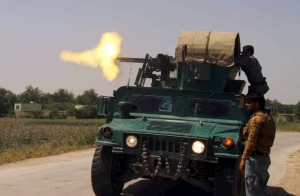By Ali Raza
Just when people were hoping that the Afghan Taliban’s strength had been broken due to the ‘sudden’ death of their leader, Mullah Omar, the attack on the city of Kunduz came as a crucial reminder of the fact that the Taliban are still a force to be reckoned with and that no political settlement is likely to last long as long as they are there on the ground and as long as such attacks keep taking place.
As a matter of fact, the fall of the city Kunduz, although short-lived, was the biggest victory for the Taliban since their fall in 2001. This episode of that unfolded in the city of Kunduz, which is also a provincial capital, highlights the stubborn insurgency’s potential to expand beyond its rural strongholds in the south of the country.
Afghan forces, hindered by the slow arrival of reinforcements but backed by limited United States (US) air support, struggled to regain control of the city after three days of heavy fighting.
“Afghan special forces now control Kunduz City, it is retaken and being cleared of terrorists,” interior ministry spokesman Sediq Sediqqi said on Twitter, adding that the insurgents had suffered heavy casualties. Deputy Interior Minister Ayoub Salangi said the city had been recaptured after a “special operation” overnight.
Local residents reported deafening overnight bombardments, adding that the Taliban were still resisting Afghan forces in some parts of the city. But some scenes of jubilation erupted around the city square where local residents, who suffered three days of crippling food shortages, thanked government troops.
According to local sources: “The Taliban suffered heavy casualties last night. Dead bodies are scattered on the streets, and their supporters are carrying them out of the city wrapped in white cloths.” Security officials said the militants had slowly infiltrated Kunduz during the recent Eid festival, launching a ‘Trojan Horse’ attack that enabled them to capture it within hours on Monday. The development coincided with the first anniversary of Ashraf Ghani’s national unity government.
Earlier in his Eid message, the Taliban’s newly appointed leader had clearly stated that the war will not come to an end as long as foreign troops continue to operate on the Afghan soil and as long as they are not allowed to resolve the crisis through an inter-Afghan dialogue.
In this context, the Taliban’s recent gains in Kunduz and neighbouring provinces highlight that a large and strategic patch of northern Afghanistan is still largely imperiled by a rapidly expanding insurgency. It is also seen as a game-changer for the fractious militant movement that has been dogged by a leadership crisis since the announcement in July of founder Mullah Omar’s death.
The rapidity with which the Taliban took over the city and then gave it up suggests that it was more of an attempt on their part to discredit the assumptions that they had lost their strength due to internal disunity.
On the other hand, their incursion into Kunduz, barely nine months after the NATO combat mission concluded, has certainly raised troubling questions about the capabilities of Afghan forces as they battle the militants largely on their own. It has also renewed questions about Washington’s plan to withdraw most US troops from Afghanistan next year; for, even after years of training and equipment purchases — on which Washington spent $65 billion — Afghan forces have been unable to rein in the ascendant insurgency.





















